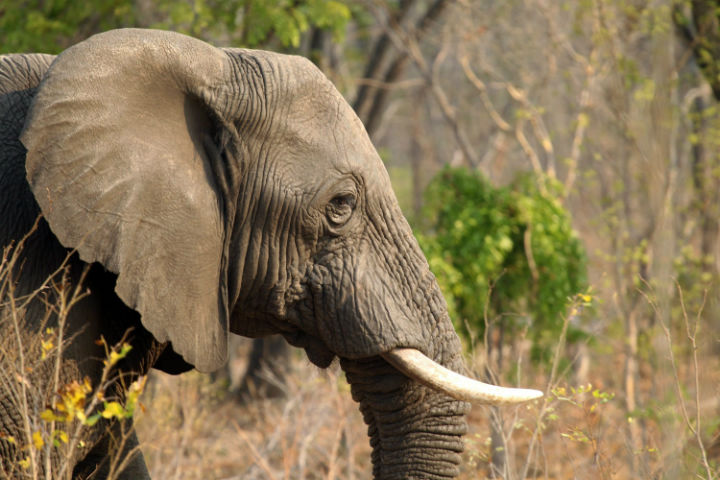A “majestic” elephant bull with long, white and brown tusks, weighing about 54 kilograms each, is believed to have become the biggest elephant killed in Africa in decades.

Fresh on the heels of the Cecil the lion controversy, a German hunter is the newest target of anger and online vitriol after a photo circulated of him celebrating his kill.
The unnamed hunter shot the animal on Oct. 8 in Zimbabwe, according to The Telegraph, and paid a reported $60,000 for the permit to do it.
The British news outlet reported the hunt was a part of a 21-day excursion to hunt the so-called “Big Five” of Africa — the elephant, rhinoceros, Cape buffalo, leopard and lion. They’re known as the “Big Five” because they are the “most dangerous animals to hunt on foot.”
Big game hunting in Zimbabwe was thrust into the international spotlight over the summer, when American dentist Walter Palmer killed a beloved lion, named Cecil, who was reportedly lured out of the country’s Hwange National Park.
READ MORE: Cecil the lion was just one of many killed by rich, foreign trophy hunters. Why is that permitted?
Cecil was being tracked and studied as a part of research being conducted through Oxford University but was also beloved by tourists visiting the park.
- High benzene levels detected near Ontario First Nation for weeks, residents report sickness
- Ontario takes action against chemical plant after Aamjiwnaang First Nation residents fell ill
- Enter at your own risk: New home security camera aims paintballs at intruders
- Fishing vessel with crane, net arrives in Zeballos for orca calf rescue
Earlier this week, officials in Zimbabwe said they would no longer seek to extradite Palmer, who paid $55,000 to hunt a lion, and he would not face poaching charges.
“He is free to come, not for hunting, but as a tourist,”” Oppah Muchinguri-Kashiri, Zimbabwe’s Minister of Environment, Water and Climate, told reporters Monday. “It turned out that Palmer came to Zimbabwe because all the papers were in order.”
His hunting guide Theo Bronkhurst, however, is still facing charges related to the hunt, for “failing to supervise, control and take reasonable steps to prevent an unlawful hunt.”
Bronkhurst was arrested in a separate case last month, accused of trying to smuggle 29 sable antelopes, including six calves, over the border into South Africa.
READ MORE: Far from Cecil the Lion’s world, big game hunting a thriving industry in Canada
The image of the downed elephant, which is believed to have been between 40 to 60 years old, has prompted more outrage from conservationists and animal rights proponents.
“It’s hard to swallow that people are just destroying all the majestic animals that we’ve got in the country,” Johnny Rodrigues, chairman for the Zimbabwe Conservation Task Force, told BBC. He noted in a separate interview with the Guardian the hunter may have had the legal paperwork to kill the elephant but “common sense” should have prevailed and conservationist should have been alerted to its existence rather than taking it down.
British comedian Ricky Gervais, who regularly uses his Twitter account to call out big game trophy hunters to his 10 million followers, asked whether he can pay the same amount of money to knock the man’s teeth out.
READ MORE: Hunter Rebecca Francis on giraffe hunt uproar: ‘I do not regret it for one second’
Opponents of trophy hunting in Africa argue greater value should be put on being able to view them alive and thriving in their natural habitat.
“When you see an animal like that, which you haven’t seen for years, you should actually put a collar on him and use him as a marketing tool,” Rodriques said.
“Individual elephants such as these should be accorded their true value as a National Heritage and should be off limits to hunting. In this case, we have collectively failed to ensure that legislation is not in place to help safeguard such magnificent animals,” Anthony Kaschula, a private safari guide who owns and operates the Gonarezhou Bush Camp, told The Telegraph.
African elephants are considered vulnerable but not endangered, according to the International Union for Conservation of Nature’s Red List of Threatened Species.
But elephant populations in Africa have been targeted by poachers hoping to fetch thousands of dollars, per kilogram, for their ivory tusks on the black market. In the past 10 days the bodies of 40 elephants have been found at different locations in Zimbabwe national parks, after being poisoned with cyanide.
According to TIME, there are an estimated 500,000 elephants roaming the African continent, but more than 50,000 of the animals are killed annually.



Comments